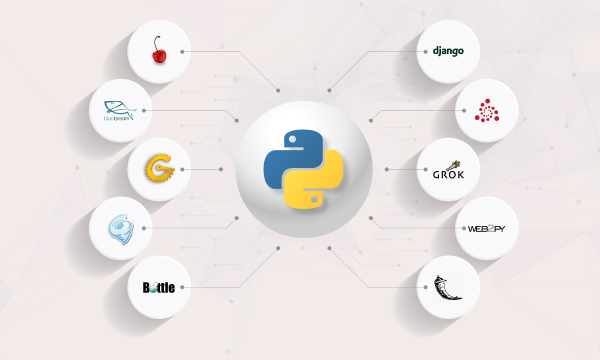
Python is an adaptable and solid programming language which has found its wide application for its versatility and power. Being one of the easiest tech tools according to Leftronic, it gained immense popularity over the years for its extensive range of applications, including web development.
Reading this article, you will find out more about the popularity of Python for web development, discover its benefits, drawbacks, and the concept of this programming language as a whole.
Python Definition
Python was invented by Guido van Rossum in the late 1980s. It is an interpreted, high-level programming language, which puts code readability into priority as well as prioritizes a clean syntax, which simolifies its’ learning for beginners to master and understand. What’s more, Python is actively leveraged within a diversity of industries, covering web development, and technologies like data analysis, artificial intelligence, scientific computing, and many others.
Python for Web Development
Python for software development puts an extensive set of frameworks and libraries into web developers’ hands, specifically tailored for creating web products of various scale and complexity. The most popular web frameworks in Python are Django and Flask.
Django is a full-featured web framework that follows the Model-View-Controller (MVC) architectural pattern, delivering a structured approach to implementing web applications. When it comes about Flask, it is a lightweight microframework that ensures an excellent flexibility, which is a go-to for moderate to medium-sized web solutions’ creation.
Pros
Python’s popularity for web development can be attributed to a range of benefits it assures. Still, it is truly significant to get a vendor with a rich experience in Python-powered programming. Without following this step, you won’t be able to achieve maximum value from Python capacity. To illustrate, by ordering Python web development services by PLANEKS, you can be sure that the final web software will have the highest quality and align with your business goals.
- Simplicity and readability. Plain syntax and well-organized code structure simplify its comprehension and development process, resulting in boosted productivity and cooperation among software engineers.
- Extensive libraries and frameworks. A vast ecosystem offered by Python for software development incorporates a diversity of libraries and frameworks, such as Django, Flask, and Pyramid, which optimize web development tasks and provide various modules for common functionalities.
- Scalability. The ability to handle heavy web traffic and support scalability of Python is truly impressive. Frameworks we’ve mentioned above offer features like caching, load balancing, and database optimization, ensuring high and smooth performance even with a large number of workloads and many user requests.
- Integration capabilities. Python seamlessly integrates with other languages like HTML, CSS, JavaScript, and SQL, which means it’s a great option for full-stack development. It also supports integration with popular databases and services, facilitating efficient data management and retrieval.
Cons
While Python offers numerous advantages for web development, it also has some drawbacks to pay attention to.
- Performance. As an interpreted language, is not as fast as compiled languages like C++ or Java. However, advancements in Python implementations, like PyPy, have significantly improved its performance.
- Global Interpreter Lock (GIL). Python’s GIL can pose limitations in multithreaded environments, potentially hindering the performance of CPU-bound tasks. Still, it doesn’t influence I/O-bound tasks and can be mitigated via a range of techniques.
Popularity of Python
Python’s popularity in web development has been steadily growing over the years. How popular is Python for web? We can face 112,135 live websites that are implemented usingPython as well as an additional 708,939 sites that used Python historically. But what are the reasons for its popularity?
- Large and active community. Python has a vibrant community of tech enthusiasts who energetically contribute to its progress and constant enhancements. The access to extensive documentation, tutorials, and online support makes it easier for developers to study, handle challenges, and share their knowledge.
- Versatility. This characteristic enables Python to be applied in the most diverse domains, attracting tech experts from different backgrounds. Its applications range from web development and data analysis to more complex technologies, bringing it a valuable skill set in today’s technology advancement.
- Industry adoption. Python has gained solid popularity in different industries, incorporating the global market players such as Google, Instagram, and Spotify. Its popularity is also conditioned by the success stories of corporations that have implemented powerful and scalable web applications using Python frameworks.
Final Thoughts
Why is Python popular for web development? We can highlight that it has emerged as a powerful and popular choice for web software due to its rich number of benefits. With a wide variety of frameworks and libraries at developers’ disposal, Python enables the creation of robust, scalable, and efficient web solutions. The advantages it offers prevail the drawbacks for many businesses. As technology continues to elaborate, the popularity of Python for web development is likely to persist and grow, making it an excellent tool to adopt in your next web product building.

